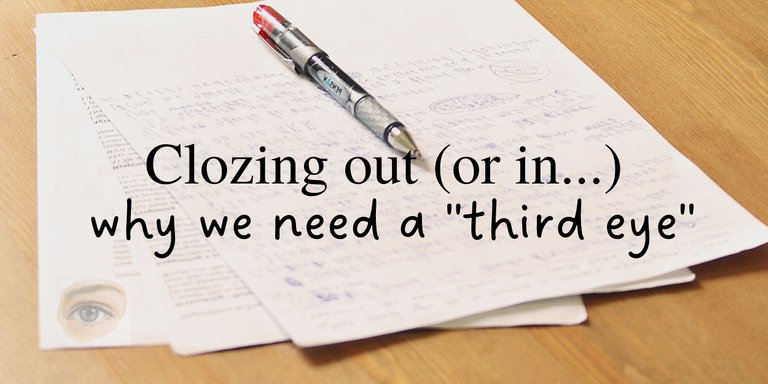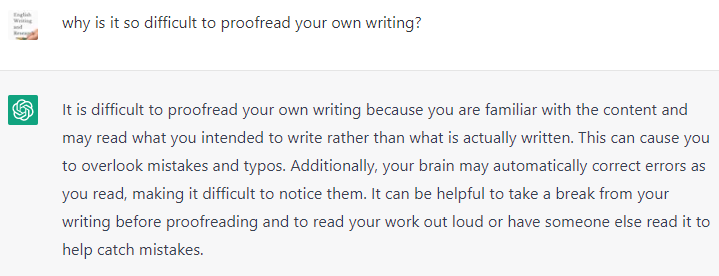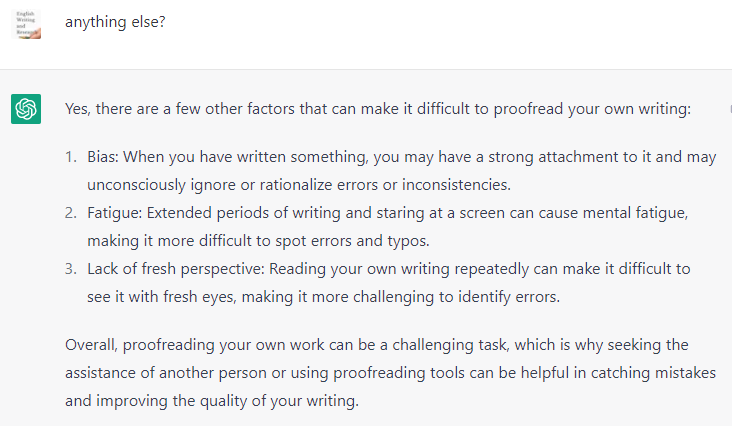Clozing out (or in...) - why we need a "third eye"

I struggle to proofread my own writing. I don’t keep it a secret. Some of the reasons I struggle are common to everyone. Others are connected to the fact that for years, I struggled with “d” and “g”. When I started learning to type (yes, I did that thing at school), I used to get “d” and “k” mixed up: if you are touch typing – yes, that’s what I was learning (and yes, I still can) – you use the same finger for those letters – the middle one. But on different hands.
When I was learning to write, the "d-g" issue was never identified as a “problem”. I have mostly grown out of it. As I have that typing error, which with a severe dose of the nerves, resulted in my failing the subject when I finished school. That – and the implications – is a conversation for another time.
A digression
When I was thinking about this piece, I had already planned much of what I wanted to say – in my head. I thought that it might be interesting to find out what ChatGPT had to say. Below is a screenshot with my first, broad question, and the response:

I was underwhelmed. So I said –

I was still underwhelmed. Not because the bot was wrong – all the reasons that it gave are valid – but rather I was looking for a somewhat deeper explanation.
As an aside to this digression, I plan another, more detailed piece looking into ChatGPT and what it "delivers" from a writer for hire's perspective.
Learning to write for reading – filling in the blanks
My first job was writing distance learning materials for second language English learners. What we all wrote had to be accessible to the learner. It was then that I learned the value of active language and plain English. I also learned about closure.
Having my writing tested
Writing for other people means that we cannot be precious about “our” writing. As a novice, my employer had to test to see whether my writing would do the job. I had to select a piece that our resident Tester converted into an exercise in which students (ours were all adult learners) participated. This test involved taking a passage from one of my lessons and blanking out every sixth or so word. Then, they gave it to a group of typical students who had to fill in the blanks to see how readable it was. This is a cloze test and it's also useful for teaching things like vocabulary and comprehension. Yes, we're all familiar with the fill-in-the-blanks exercise.
What I my writing scored isn’t relevant. What is, is that in my early 20s, I learned that one’s writing can be predictable. If your reader can fill in the blanks, so will you. Whether they’re there or not. This is something we need to bear in mind when we proofread our own work.
Our brains automatically fill in the blanks.
Another digression: readability is not just about words
Readability is also about how the text is presented. Our eyes (brains) expect certain patterns including the spaces between words. When we write by hand (if you still do!), the spaces between your words, is pretty regular right? Similarly, this typed text on your screen.
Let’s look at a screenshot of the same paragraph, below, laid out differently:

That last sentence is quite awkward to read, isn’t it?
So, in laying out writing, the decision is whether the page looks pretty and organised, or whether you really want the reader to engage with the writing?
Patterns and expectations
Humans are “wired” to see patterns. This means that we unconsciously fill in the gaps – in pictures – and in our writing.
This is what underpins Gestalt theory which informs visual and web design. It’s best understood by the phrase that we all often bastardise, “the whole is something else than the sum of its parts” attributed to Kurt Koffka, one of the founders of Gestalt psychology.
Proofreading is hard
So, ChatGPT is not wrong when it says that proofing our own writing is hard because we are familiar with it. Yes, our brains automatically correct the mistakes. I wanted to get into why we overlook the mistakes and the typos that inevitably creep into our writing – even as we revise and edit our pieces to make them better.
Watch out for my proofreading tips.
Last word
I wrote this piece in response to a discussion with a client, so it was first published here. It occurred to me that as many of us write for our blogs on Hive, and it could be of use.
Until next time, be well
Fiona
The Sandbag House
McGregor, South Africa

Photo: Selma
Post script
If this post might seem familiar, it's because I'm doing two things:
- re-vamping old recipes. As I do this, I am adding them in a file format that you can download and print. If you download recipes, buy me a coffee. Or better yet, a glass of wine....?
- and "re-capturing" nearly two years' worth of posts.
- From Wordpress, I use the Exxp Wordpress plugin. If this rocks your socks, click here or on on the image below to sign up.

- Join Hive using this link and then join us in the Silver Bloggers' community.

Original artwork: @artywink
- lastly, graphics are created using partly my own photographs, images available freely available on @hive.blog and Canva.
Well that explain a LOT!
Thanks for that. Sometimes I don't even know how I've missed stuff... now I know 👍
If you don't check then you will never miss stuff🤣
This is true. But I have readers who point out my mistakes... 🤣🤣🤣
haha the sneaky wee buggers!
Valid point! 🧐😆
I check three times and still miss stuff!
!LUV
@tengolotodo, @nickydee(2/3) sent you LUV. | tools | discord | community | HiveWiki | NFT | <>< daily
NFT | <>< daily
Me, too. I thought it important to write this because people for whom we write expect perfection. This explains why it's almost impossible to achieve. I think I should add a link to this article in my electonic CV and virtual portfolio.
This is why we need editors.
Two of them preferably.
I believe they used to read copy upside down to proof it, once upon a time.
Because of the exact mechanisms you speak of here.
Apparently if you read it upside down the brain doesn't fill in the gaps so much and the eye can spot the errors better
Sounds like a rough job!
It's good to share but not sure I'd add it to a CV...
Proofreaders and editors have different jobs. The former finds superficial mistakes - typos, spelling, punctuation, etc. Editors read for clarity, flow, argument and a whole lot more. So, both have a role and each needs a brief. If I give something to someone to proof, I don't want it edited. I have had that experience and it changed everything about the book I was writing - from its underlying philosophy to its structure. So. Just no.
Yes, there are times I am precious about my writing! lol
😆
I hear you. The artist's way! Stay you ❤️
!LUV
@fionasfavourites, @nickydee(3/3) sent you LUV. | tools | discord | community | HiveWiki | NFT | <>< daily
NFT | <>< daily
Proofreading your own stuff is very hard!
I enjoy doing others though😁 (mebbe cuz I am evil👹)
I doubt that!
I also like working with other people's writing. Editing and proofing are very different briefs. I like panel beating. Proofing is not that. It's much more light touch and a discipline for me. Does that make me evil? Mebbe! 😈 🤣
🤐
I do my best proof reading after I hit send 🙈🙈 have you ever typed kind retards instead of kind regards?
......
....
...
..
.
You can't unsay that 😂🙈
Hahaha! That's hilarious! No, I haven't, but the fncking autofill has sent mail to the wrong person... 😱
Oh god totally 😂😂😂😂😂